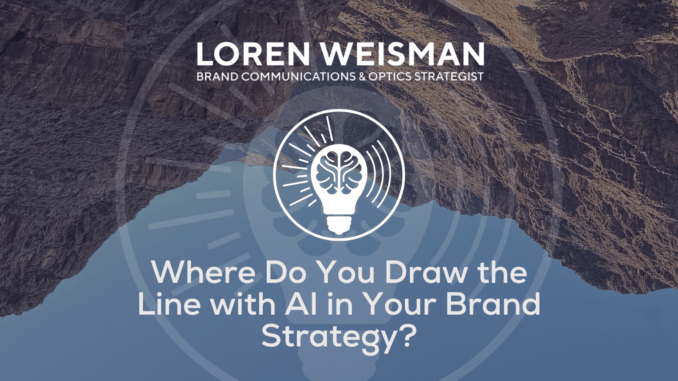
Where Do You Draw the Line with AI in Your Brand Strategy?
Some thoughts for Entrepreneurs, Investors, and Authentic Brands
 AI’s role in branding and marketing has expanding even more rapidly than ever before.
AI’s role in branding and marketing has expanding even more rapidly than ever before.
But as small businesses, startups, and entrepreneurs adopt these tools, a critical question seems to emerge: Where do you draw the line with AI in your brand strategy? Especially when it comes to honor and truth.
As a Brand Communications and Optics Strategist, I try to help more authentic businesses navigate this balance. I do believe AI offers undeniable advantages… faster research, content optimization, and data-driven insights.
Yet an, over reliance and crutch risks diluting authenticity, transparency, and trust. Consider a few ideas in how to leverage AI ethically while protecting your brand’s integrity and staying honest… at least in my opinion.
A Double-Edged Sword with AI in Branding
AI tools streamline tasks like keyword research, social media scheduling, and audience analytics. For time-strapped entrepreneurs in Orlando, St. George, or beyond, these efficiencies can accelerate growth and be very useful.
But when AI crosses from assistant to author, I think serious problems arise.
Scripts, marketing copy, or branded content generated entirely by AI often lack the human nuance that can build genuine connections while at the same time, make someone with no knowledge appear as an expert.
Consider asking yourself:
Are you being transparent?
Would you openly and honestly be able to explain your AI use to clients or investors?
Are you maintaining accountability?
AI errors can escalate into crises without human oversight. Are you looking into the information and research shared to ensure it is substantiated and true?
Is your brand voice consistent?
Over-automation can risk muddying your messaging. Are you aligning facts with the foundation of your messaging and brand… not just using prompts to create hype that has nothing to do with you to try to gain views?
In my work with startups and small businesses, I’ve seen firsthand how unchecked AI adoption can erode audience trust as well as how people seem to use it for pure popularity and false authority.
A few Steps to Ethical AI Integration
Define Your AI Boundaries
Use AI for repetitive tasks: keyword analysis, data sorting, or trend forecasting. Consider avoiding outsourcing creative work that defines your brand’s voice or having AI become the creator over it being a creative embellishment for your ideas.
Audit Transparency
Consider disclosing how you use AI use where applicable. For example, include adding an AI Usage Statement.
Implement Guardrails
Consider creating a checklist for AI-generated materials:
Does this align with our mission and the truth?
Would we share how we use AI publicly?
Does it reflect and resonate with our team’s genuine expertise?
AI in Crisis Communication: Proceed with Caution
AI’s speed can aid crisis response… monitoring social sentiment or helping to draft initial statements. Still, automated replies can often worsen PR disasters. Especially if the prompt and its results are not vetted and checked for objective truth.
(and only serving to fluff and redirect)
“Remember, AI is not held liable, but you may be, especially if you are in the health or legal fields.”
I wish all could be held liable for their statements… AI or just posts, videos and ads. I would love to see laws in place for people to be held responsible for what they posted as if they were being cross examined in a court of law.
Would your statements hold up or would you get in trouble?
Ai Video Short from Brand Communications and Optics Strategist Loren Weisman
Final Thoughts
I understand and like the supplementing, embellishing and assisting tools, but when it comes to AI being used as a crutch, as misdirection and even as deception to create false knowledge, wisdom or expertise, it bothers me.
I also understand some will just choose to use it to make a buck and could care less about the above… but still, I hope in my heart, that more will take the steps to hold themselves accountable for what they say, share and present online and off… both with and with out AI.
I hope you can draw your line clearly where AI begins to overshadow human judgment, creativity, or transparency… and not cross it.
